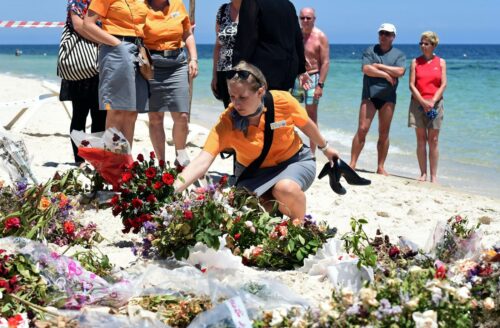You were not on the beach in Tunisia …
… but the events there have changed you
And you were not in that church in Charleston, but the events there have changed you
Break-dancer to beach bomber
So a young man who enjoys hip-hop music, is spoken of highly in his home town, and is completely unknown to local security forces become willing and able to kill 38 people on a sunny beach.
Lots of people have written about the devastating facts of this incident. Lots of people have written about radicalisation, where an individual is re-configured inside out. But few people have written about how acts of terror affect and change all of us who simply observe them from afar. You were thankfully not on that beach, but you are affected; you are changed. Whenever a new depth of depravity is plumbed I believe we are all changed, and not for the better.
Sousse Beach, Tunisia
Things we don’t want to know
A generation ago the idea of the now customary suicide bomber was outside our frame of thought. Similarly the idea of an innocent person being be-headed and videos of this being widely available simply never occurred to us – why would it? Of course there have been cases of brutality in the past, particularly in war time, but we are less affected by these because of the elapse of time and the fact that the acts however repugnant were committed in a time of conflict, they were not “normal”.
And it’s not just terrorists who come up with previously un-thought of acts of inhumanity. Some years ago I remember watching with disbelief as the saga of Josef Fritzel unfolded in the news. In 1984 Fritzel lures his 15 year old daughter Elizabeth into a specially built room in the cellar and traps her there — for 24 years! He visits her approximately twice a week and routinely rapes her. She gives birth to 7 children some of whom live exclusively in this dark world until their teens, when the authorities are finally made aware of what transpires in the cellar.
I honestly wish I didn’t know what this man did, it’s uncomfortable, but I do and I can’t erase it. The very idea that a human being could do this has entered my consciousness for the first time. A new depth has been reached. – the bar for human behaviour has been driven even lower.
We can’t pick and choose what we “know”
So whenever there will be a new act where somebody somewhere enacts a hitherto unimagined scene of inhumanity, as well as the acts themselves, what is disturbing is the “knowledge” of these acts which becomes part of us. We are in a long-term process of desensitisation where we almost expect appalling acts of violence, we are not that surprised by them, and, if we are not careful we are less troubled by them. It is the knowledge of good and evil which at one time we were guarded from, but now the reins are off — we have a familiarity with evil we never had, and never wanted.
God’s image within us needs to be cultivated
We need to care for the God given sensitivity which is central to the image of God placed in each of us. But how do we do that? How do we literally nurture God’s image within us? We can do something.
When an evil-minded or deranged individual takes the lives of those around them, apart from any practical help we may be able to offer, we need to make sure we make time to grieve for those affected, and confess and repent of the damaged nature of all our race, our kind. Doing this in prayer and in conversation will slowly restore you for the better, it will move you in the opposite direction to the collective knowledge of atrocities with their desensitising impact.
Doing something physical to develop our minds is a scriptural principle. For example through our physical actions we develop a deeper sense of love. Loving our neighbour does not mean we like them. We have to love people we don’t get on with and we do this by our actions, by our deeds. “Doing kindness” and praying for people I don’t really like opens up my heart so that God can change how I think, (and sometimes I actually do end up liking them).
So next time you hear of an act of atrocity and you are tempted to cocoon yourself, to switch off the news and not think about it; don’t.
God’s image in us — takes work
“Therefore, as God’s chosen people, holy and dearly loved, clothe yourselves with compassion” Colossians 3.12; or: put on the clothes God picked out for you — even if you don’t feel like wearing them.
On a related note, try reading Nothing is Sacred Except Satire
This blog was also published by The Baptist Times




True that though we’re not in these places when they happen, they affect us directly or indirectly. I remember when I first learnt about some persecuted Christians, persons who were killed because they held a bible, I returned home that very day, and since, have learnt to cherish enormously the physical bible. What may have been considered mere paper cost someone’s life. I agree with ” “Doing kindness” and praying for people we don’t really like opens up our heart so that God can change how we think – and often we actually do end up liking them”. Not only… Read more »
Hi Sally – thanks for reminding us that we can be affected by traumatic events positively as well as negatively — good thoughts
Here’s a question: If we fail to challenge all religious beliefs no matter how innocuous they may seem, are we starting down a path that some will follow to the extreme. i.e. Once we say there’s an afterlife with rewards, or that there’s cases where discrimination against a particular group (gays/other faiths) is fine, does that give a implicit affirmation to those who will go much further say “kill a member of that bad group, and God will reward you in heaven” ? Where is the line drawn between “mild crazy”, and “obvious insanity”? Is it time to educate children… Read more »
Thanks for the question Paul First I agree that religious beliefs can be challenged and should be challenged – they should stand the test of challenge. I also agree with you when you say we must educate our children that no violent acts can be “hidden behind a faith”. Here is where I disagree. I think “religion” gets conveniently blamed for many things where in fact people with extreme philosophies are just looking for a way to express a prejudice violently. Often these extreme events are connected with people’s background (or race) and their perception that they are somehow suffering the… Read more »
Very well written, and yes you are right, they do change us even when we think it doesn’t! I like your suggestion to pray about these things. I can’t say my heart has grown cold, but overwhelmed with the constant barrage of these situations
Hi Sonya — yes a continual barrage of events and atrocities certainly does desensitise us, and we need to be watchful and aware that the ability to sympathise, empathise, and of course react which comes from God’s image within us, is a fragile thing.
hankful that some of my Brothers in Christ can be touched as you. Well said.
Appreciate your comment
Thanks for that Garry
Thanks Chris. You’re right that we sadly get “used” to this horrific stuff, but for some of us it makes us value the good and strive for a more inclusive world. As we have discussed privately as with the brave mothers of Northern Ireland for example, the only way to break the cycle is not to strike back as much as it goes against your natural instinct.Otherwise the horror is self perpetuating.
For sure. We are all affected by the knowledge of these events. It can definitely work against us — ie the profound kind of evil that Fritzel committed which I frankly “don’t want to know”, and that’s the subject of my blog. But yes it can also bring out virtues in individuals, courage, resolve, and in your example, forgiveness.
Well said Chris!
… and thanks for sharing on Facebook
That was a wonderful read and will help many people Thank you for your article.??
Thanks April — good thoughts from you too on “praying for your mind”. https://www.linkedin.com/grp/post/3557315–6022111304360169472